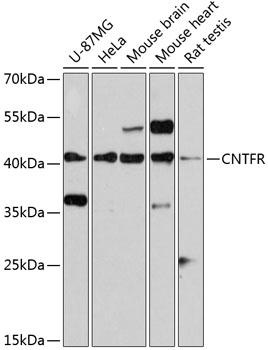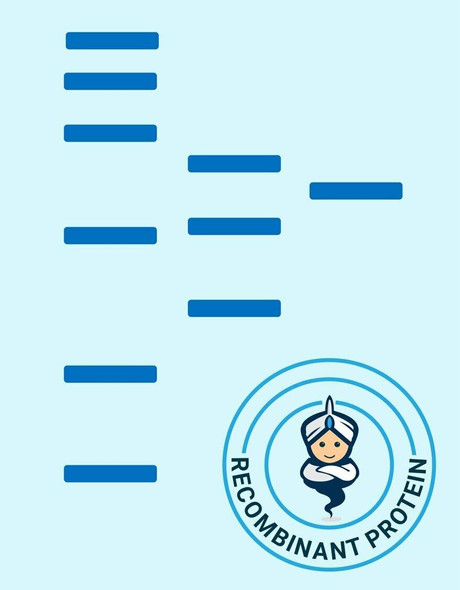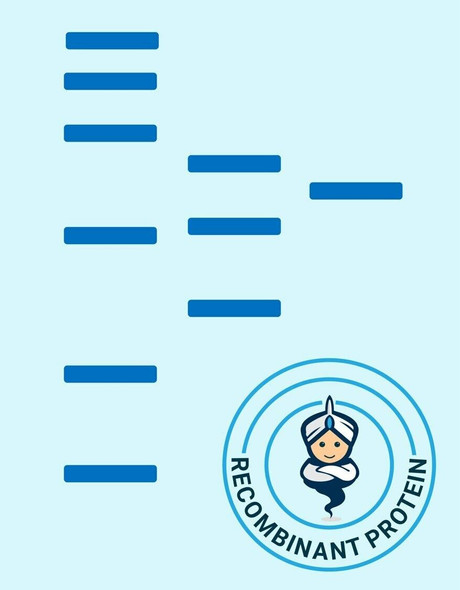Anti-CNTFR Antibody (CAB2700)
- SKU:
- CAB2700
- Product type:
- Antibody
- Reactivity:
- Human
- Mouse
- Rat
- Host Species:
- Rabbit
- Isotype:
- IgG
- Research Area:
- Cell Biology
Frequently bought together:
Description
| Antibody Name: | Anti-CNTFR Antibody |
| Antibody SKU: | CAB2700 |
| Antibody Size: | 20uL, 50uL, 100uL |
| Application: | WB |
| Reactivity: | Human, Mouse, Rat |
| Host Species: | Rabbit |
| Immunogen: | Recombinant fusion protein containing a sequence corresponding to amino acids 190-340 of human CNTFR (NP_001833.1). |
| Application: | WB |
| Recommended Dilution: | WB 1:400 - 1:2000 |
| Reactivity: | Human, Mouse, Rat |
| Positive Samples: | U-87MG, HeLa, Mouse brain, Mouse heart, Rat testis |
| Immunogen: | Recombinant fusion protein containing a sequence corresponding to amino acids 190-340 of human CNTFR (NP_001833.1). |
| Purification Method: | Affinity purification |
| Storage Buffer: | Store at -20°C. Avoid freeze / thaw cycles. Buffer: PBS with 0.02% sodium azide, 50% glycerol, pH7.3. |
| Isotype: | IgG |
| Sequence: | NATA ITFD EFTI VKPD PPEN VVAR PVPS NPRR LEVT WQTP STWP DPES FPLK FFLR YRPL ILDQ WQHV ELSD GTAH TITD AYAG KEYI IQVA AKDN EIGT WSDW SVAA HATP WTEE PRHL TTEA QAAE TTTS TTSS LAPP PTTK ICDP GEL |
| Gene ID: | 1271 |
| Uniprot: | P26992 |
| Cellular Location: | Cell membrane, GPI-anchor, Lipid-anchor |
| Calculated MW: | 40kDa |
| Observed MW: | 41kDa |
| Synonyms: | CNTFR |
| Background: | This gene encodes a member of the type 1 cytokine receptor family. The encoded protein is the ligand-specific component of a tripartite receptor for ciliary neurotrophic factor, which plays a critical role in neuronal cell survival, differentiation and gene expression. Binding of ciliary neurotrophic factor to the encoded protein recruits the transmembrane components of the receptor, gp130 and leukemia inhibitory factor receptor, facilitating signal transduction. Single nucleotide polymorphisms in this gene may be associated with variations in muscle strength, as well as early onset of eating disorders. Alternatively spliced transcript variants have been observed for this gene. |
| UniProt Protein Function: | CNTFR: Binds to CNTF. The alpha subunit provides the receptor specificity. Belongs to the type I cytokine receptor family. Type 3 subfamily. |
| UniProt Protein Details: | Protein type:Membrane protein, GPI anchor; Receptor, misc. Chromosomal Location of Human Ortholog: 9p13 Cellular Component: extrinsic to membrane Molecular Function:cytokine binding; ciliary neurotrophic factor receptor activity; receptor binding Biological Process: nervous system development; suckling behavior; positive regulation of cell proliferation; negative regulation of neuron apoptosis; signal transduction; sex differentiation |
| NCBI Summary: | This gene encodes a member of the type 1 cytokine receptor family. The encoded protein is the ligand-specific component of a tripartite receptor for ciliary neurotrophic factor, which plays a critical role in neuronal cell survival, differentiation and gene expression. Binding of ciliary neurotrophic factor to the encoded protein recruits the transmembrane components of the receptor, gp130 and leukemia inhibitory factor receptor, facilitating signal transduction. Single nucleotide polymorphisms in this gene may be associated with variations in muscle strength, as well as early onset of eating disorders. Alternatively spliced transcript variants have been observed for this gene. [provided by RefSeq, May 2011] |
| UniProt Code: | P26992 |
| NCBI GenInfo Identifier: | 1352099 |
| NCBI Gene ID: | 1271 |
| NCBI Accession: | P26992.2 |
| UniProt Related Accession: | P26992 |
| Molecular Weight: | 40kDa |
| NCBI Full Name: | Ciliary neurotrophic factor receptor subunit alpha |
| NCBI Synonym Full Names: | ciliary neurotrophic factor receptor |
| NCBI Official Symbol: | CNTFR |
| NCBI Protein Information: | ciliary neurotrophic factor receptor subunit alpha |
| UniProt Protein Name: | Ciliary neurotrophic factor receptor subunit alpha |
| Protein Family: | Ciliary neurotrophic factor receptor |
| UniProt Gene Name: | CNTFR |
| UniProt Entry Name: | CNTFR_HUMAN |






